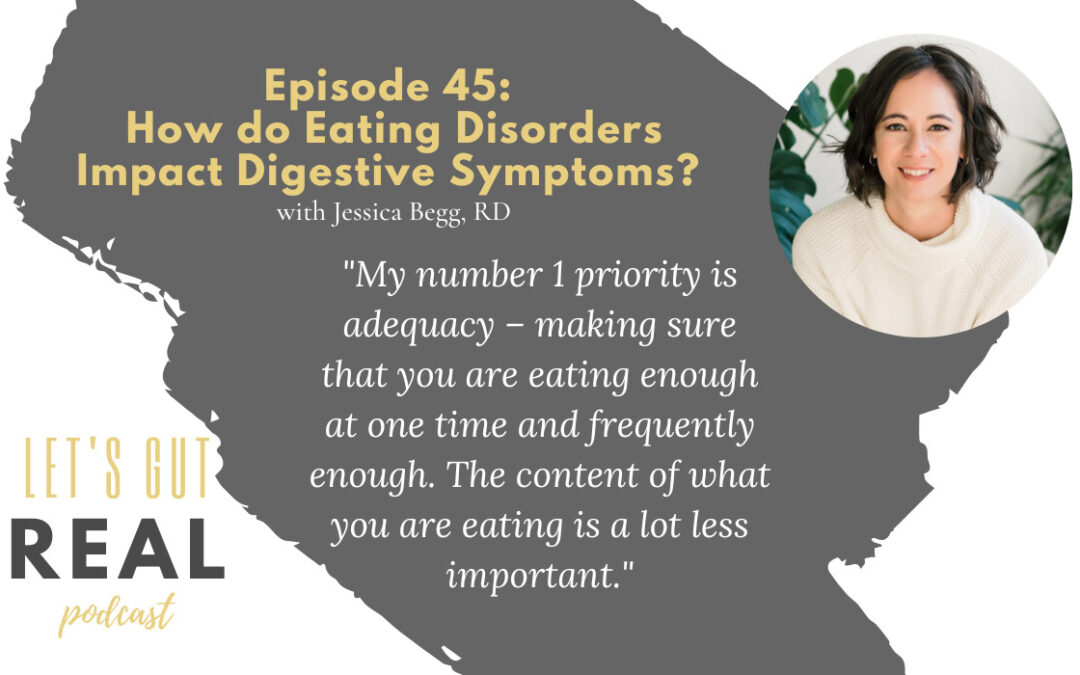Digestive disorders often overlap with emotional eating, binge eating, and other eating disorders. This week we take a look at ways to help manage eating disorders while also trying to understand how eating behaviours can impact digestive symptoms. With the ultimate goal of trying to improve them.
Nutrition Pearls for Eating Disorders and Digestive Symptoms:
- Disrupted eating patterns can lead to issues with gut symptoms.
- Symptoms like bloating, abdominal pain, and changes in bowel habits – especially constipation are common with patients who have eating disorders.
- It’s important to focus on adequacy (eating enough) and regular meals throughout the day
- Clients have historically been food and weight shamed by health professionals – so we need to approach our patients with this in mind.
- Be aware that persistent food tracking can be a form of trauma for a lot of patients.
- Be aware that chronic dieting has been normalized in our society and it is not an indication of things going well.
- Binge eating is diagnosable and is described as more than one person would eat during a specific time zone – there’s a real sense of feeling out of control.
- A good way to tell if emotional eating is problematic is when it becomes distressing.
- Largely, emotional eating and binge eating have begun with restriction.
- When patients restrict there’s a rebound effect where they are prone to feeling out of control.
- If patients have been accustomed to thinking that a very small amount of calories is what they should be eating – then eating anything can often feel like you’ve eaten too much.
- If you, or someone you know is struggling with their food relationship – know that it’s okay if you aren’t as sick as other people that you may have heard of. It’s better to seek treatment before things get worse.
Diet culture has a profound impact on our beliefs about nutrition and health. It can impact our behaviours and may lead to disordered eating which can have far reaching impacts on our bodies ability to digest food and further lead to uncomfortable digestive symptoms.
This week I interview Jessica Begg, RD on how emotional eating and binge eating influences our digestive symptoms.
Jessica Begg is both a Registered Dietitian as well as a Registered Clinical Counsellor. Jessica’s double qualifications make her uniquely suited to helping clients address the psychological issues that underpin their challenges with eating. She has been working in the area of disordered eating and within eating disorders treatment programs since 2006. Jessica works from a trauma-informed, emotion-focused, weight-inclusive and weight-neutral, anti-diet or non-diet approach. Jessica’s approach allows her clients to live their lives to the full by unshackling their beliefs about diet culture.
She is currently living in Vancouver where she practices clinical nutrition counselling.
We talk about:
- How Jessica became involved in working with patients with eating disorders
- The prevalence of digestive symptoms in eating disorders and what symptoms people usually complain of
- Why manipulating the diet, being the knee jerk approach that registered dietitians MIGHT use, may not be appropriate (Especially registered dietitians without eating disorder experience)
- The importance of screening for eating disorder behaviours
- How emotional and binge eating influences digestive symptoms
- Important things to consider/do to reduce emotional and binge eating
- How restrictive diets for digestive disorders might trigger binge eating /emotional eating, and the problems with that
Connect with Jessica on her website at shiftnutrition.com or on Instagram or on her Facebook or on Twitter here as well!



I have IBS but feel there’s more of a problem. For many months I have had a bloated belly, more like a pregnant look but I am 79 years. My belly is hard as a roc when standing or sitting and flat when laying down.
Ah that is so frustrating to have that much bloating and distension! be sure to talk with your dietitian and gastroenterologist to make sure nothing is missed and to help you resolve that. IBS can cause severe bloating but usually with dietary and lifestyle interventions – it improves. If it isn’t improving definitely discuss with your doctor to see what else can be done!